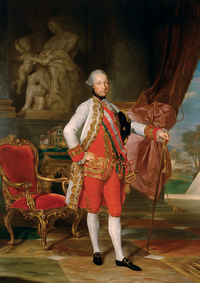War of the Habstrian Succession
| War of the Habstrian Succession | ||||||||||
|---|---|---|---|---|---|---|---|---|---|---|
 Battle of Switz-Gloschlick | ||||||||||
| ||||||||||
| Belligerents | ||||||||||
|
|
|
| ||||||||
| Commanders and leaders | ||||||||||
|
|
|
| ||||||||
The War of the Habstrian Succession was a military conflict between most of the great powers of Dolchland, lasting between 1795 and 1797. It marked the beginning of Pax Panedonia, an era lasting about a century in which the Kingdom of Panedonia ruled Dolchland with relitive peace.
The conflict began following the death of King Leopold III of Habstria, who had no sons. Immediately after word of his death spread two major factions formed around two possible heirs, Heinrich, Duke of Gloschlick, the nephew of King Leopold through his sister Josephine, and Francis of Ausburg, Leopold's grandnephew through his brother Albert. Habstrian succession law was unspecific and having died unexpectedly Leopold left no will. It was debated heavily in the Habstrian Royal Estate whether an heir could pass through a female relative, or through a solely male line.
Francis of Ausburg was only 16 when his great uncle died, and resided with his mother Theresa of Wurveria, the half sister of King Alexander of Wurveria. Upon heraing of Leopold's death Theresa declared that Francis was the rightful heir, however Heinrich had already sought support from several powerful Habstrian nobles along with the central army. Heinrich succeded with many Habstrians as he played up fears that Theresa would force her son to renounce his Ausburg name, and become a member of the House of Wurveria. Heinrich, whose mother and father were cousins and thus both members of the House of Ausburg, had inherited the Duchy of Gloschlick, a very wealthy province with a sizable levy that could be used to seize power quickly in Morthal. The young Francis and his mother moved to Rotcassel Palace soon after hearing of Heinrich's intentions. Two months after the death of Leopold, Heinrich had himself crowned king in Morthal Cathedral, and soon after dispatched a force to capture Francis and Theresa, which they did and transported them to Alberhof Palace. Upon hearing of his half sister and nephews kidnapping, King Alexander of Wurveria declared war on the new Habstrian regime and declared Heinrich illegitemate. Alexander soon called his ally Panedonia into the war, and soon the conflict became less about the succession of the Habstrian crown, but about power within the Empire.
Soon after the break out of war Heinrich called his vassal Macklenover to his side however the King in Macklenover refused to raise his armies. Heinrich took this as an act of treason and rebellion and sent his army to capture Bertricht and the Macklenoverian royal family. Upon hearing of this the King in Macklenover took up residence in Enselhof Palace in Panedonia, and rallied his armies there. The Habstrian army, unable to capture the King, sacked Bertricht, destroying much of the old city, and executing nobles loyal to the Macklenoverian King. Macklenover would be under Habstrian occupation for the entirety of the war, with exiled troops being placed under Panedonian command. The war ultimately lead to Macklenoverian independence and the establishment of the Kingdom of Macklenover.
After securing Macklenover Heinrich moved a large force to his possesion of Gloschlick, where he met the combined forces of Panedonia, Macklenover and the Electorate of Runesburg. The battle of Switz-Gloschlick was a decisive battle in the war and a crushing Habstrian defeat, it also made many Habstrian leaders question the leadership and legitimacy of Heinrich. By 1796 both sides were weakened, especially Habstria, this lead to a peasant's revolt lead by republican Johan Tapp and a council of revolutionaries. The revolution was quickly surpressed, however they did succeed in executing the Elector of Compenburg and Erska, along the majority of his family and much of the city of Compenburg which was loyal to him. Tapp and most of his fighters were severely punished, and the Compenburg massacre is often used as a way of justifying anti-democratic policies in Dolchland.
By early 1797 in the south Panedonian forces had liberated most of Macklenover and were now pushing into Habstrian territory, and in the north Wurverian, Runesburgian and anti-Heinrich Habstrian forces were moving towards Morthal. This lead to widespread desertion and defection among the Habstrian ranks. General Wilhelm von Gausmacht, a Habstrian general fighting the Wurverian push, decided that Heinrich should be removed from his position as King, and decided to use his forces to assist in the push to Morthal. By August the city of Morthal was under seige, and Heinrich was forced to surrender by his own Palace guards. A few months later the Treaty of Morthal was signed, recognising the now adult Francis of Ausburg as King Francis II of Habstria, recognising the independence of Macklenover, and ceding the Duchy of Gloschlick to Panedonia. However Francis would die with only female descendants, and the throne passed to Heinrich's grandson.
